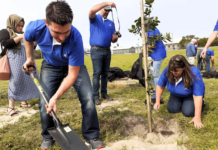Bidvest company, Konica Minolta South Africa has demonstrated its commitment to the World Wide Fund for Nature’s (WWF) rhino conservation work by donating R285600. This is the company’s Q2 2012/2013 contribution, which brings the total donated for the first half of this financial year to more than R560000.
Last year, 668 rhinos were lost due to illegal killings in South Africa, representing an alarming increase on the previous year’s record of 448 animals killed for their horns. In response to this dramatic increase, in September 2012 WWF South Africa launched a new national programme to strengthen rhino conservation efforts. Part of this programme covers ongoing support for the Africa-wide rhino database using rhino horn DNA analysis (RhODIS), which contributes to forensic investigations at the scene of the crime and for court evidence to greatly strengthen prosecution cases.
Funds donated by Konica Minolta South Africa are used to assist project partners in achieving the programme’s strategic goals, including the critical work of the University of Pretoria’s Veterinary Genetics Laboratory, in assisting in the running and further development of RhODIS. According to WWF, Konica Minolta South Africa’s substantial financial contribution in 2012 played a critical role in sustaining RhODIS, which in turn contributed compelling evidence to more than 400 rhino poaching cases and impacted on the length of sentences handed down.
Dr Jo Shaw, rhino coordinator of WWF-SA, said, There is no single solution to the poaching crisis and a range of related activities are needed right along the illegal chain. Criminal syndicates involved in illegal rhino horn trade have become increasingly sophisticated. WWF-SA will support enhanced communication and collaboration between law enforcement agencies to enable them to act proactively and arrest and prosecute with the greatest impact.
We are delighted that the WWF-Konica Minolta South Africa relationship has played a role in broadening the RhODIS reach within South Africa as well as the system’s introduction into Kenya, where a large percentage of the critically endangered East African black rhino population resides, said Alan Griffith, MD of Konica Minolta South Africa.
Konica Minolta South Africa is serious about assisting in the preservation of the majestic rhino and looks forward to a sustained relationship with WWF-SA, with continued support for rhino horn DNA profiling. We hope that the sponsorship provided can help towards the production and distribution of 600 forensic kits for up to five Africa rhino range states this year, said Griffith.




















